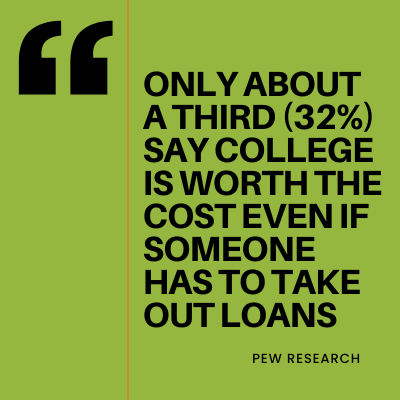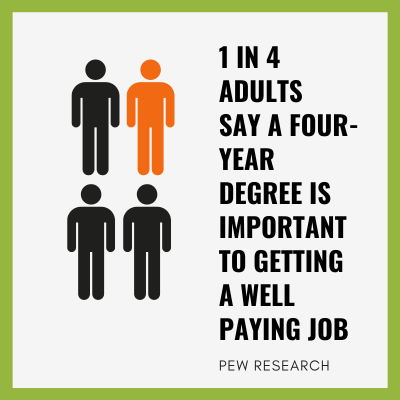Report by American Student Assistance
EXECUTIVE SUMMARY
Parallel Shifts
CHANGE IS AFOOT in the world of work, where more employers—spurred on by a Great Resignation and difficulty finding people qualified to fill key roles—are expressing a desire to look beyond
the degree1 for talent. Yet, many employers are stuck in a rut of looking to the college degree as the primary signifier of workplace readiness, even though there are strong signals that this model has not served them well. Even before the pandemic, research showed2 that some 80% of Human Resource leaders could not find workers with the skills they needed. In 2022, things are far more dire. Nearly half (47%) of businesses report that they have jobs they simply cannot fill, which greatly exceeds the 48-year average. There are some 11.4 million unfilled positions3 in the U.S. today, many of which do not require a degree. The impacts of so many unfilled jobs on the economy and the wellbeing of families and businesses has wide-ranging and potentially serious impacts.
At the same time, there is also a shift taking place among Gen Z youth, who are skeptical of the well-trodden high school-to-college route but are unsure how to navigate the growing array of postsecondary education paths. There were 662,000 fewer students enrolled in undergraduate programs in the spring of 2022 than the previous spring,4 constituting a drop of 4.7%; a drop of 1.4 million is reported since the beginning of the pandemic. A recent survey of high school students found that the likelihood of attending a four-year college dropped by nearly 20% in less than a year.5 Nonetheless, when making decisions about their post-high school future, today’s young people still largely tend to default to a college or failure mindset. For some, the assumption that the college degree is the pinnacle of success is so pervasive that, regardless of their own desires, they never discuss other options. We heard this sentiment from a Gen Z respondent in our survey:
“We never even brought up the fact of not wanting to go to college.”
Or if you are ready to see how Jobspeaker can help, schedule a demo today!


